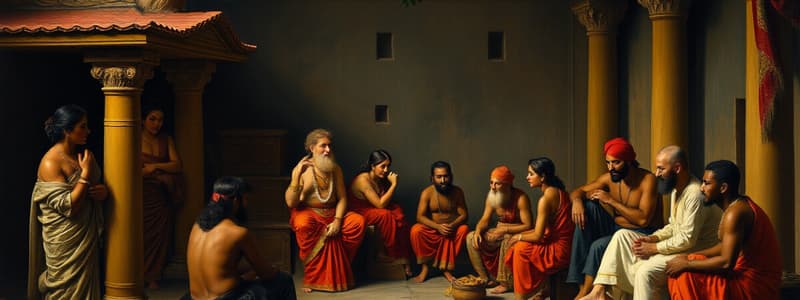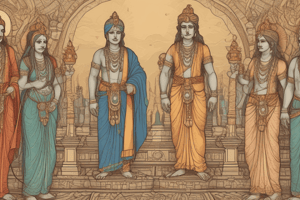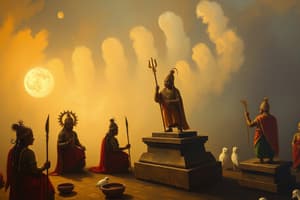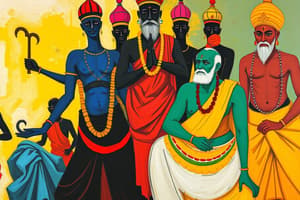Podcast
Questions and Answers
What does the Caste System control?
What does the Caste System control?
- Occupation
- Daily life aspects
- Economic potential
- All of the above (correct)
What are the origins of the Caste System?
What are the origins of the Caste System?
A rigid social structure evolved that drew on Aryan ideas.
How does the Caste System affect daily life?
How does the Caste System affect daily life?
It determines marriage, dietary choices, job roles, and clothing.
How did the Caste System become more complex over time?
How did the Caste System become more complex over time?
How does the deity Purusha relate to the Caste System?
How does the deity Purusha relate to the Caste System?
Which of the following is NOT one of the Four Noble Truths of Buddhism?
Which of the following is NOT one of the Four Noble Truths of Buddhism?
How has Hinduism influenced the social structure in India?
How has Hinduism influenced the social structure in India?
How did Buddhism spread?
How did Buddhism spread?
In what way does the belief in reincarnation contribute to social control?
In what way does the belief in reincarnation contribute to social control?
What are the advantages of monotheism?
What are the advantages of monotheism?
What makes up the Hebrew Bible?
What makes up the Hebrew Bible?
What is the Talmud?
What is the Talmud?
The first four commandments concern themselves with:
The first four commandments concern themselves with:
The last six commandments concern themselves with:
The last six commandments concern themselves with:
How is Hinduism different from Buddhism?
How is Hinduism different from Buddhism?
How are Hinduism and Buddhism similar?
How are Hinduism and Buddhism similar?
Flashcards are hidden until you start studying
Study Notes
Caste System
- A crucial aspect of Hindu society, dictating daily life through rigid social categories.
- Determines marriage, dietary choices, employment, and clothing based on social class.
- Main groups: Brahmin (priests), Kshatriya (warriors), Vaishya (merchants), Sudra (laborers).
- Untouchables, facing the harshest societal roles, handle tasks undesired by others.
Origins and Evolution of the Caste System
- Originated from Aryan societal structures, evolving into a complex and rigid hierarchy.
- Initially, caste was not strictly hereditary, allowing changes in social status based on occupation.
Role of Purusha in the Caste System
- The deity Purusha symbolizes the caste system; different body parts signify different social classes.
- For instance, his mouth represents the Brahmin class (priests).
Four Noble Truths of Buddhism
- Life inherently includes suffering and sorrow.
- Suffering is linked to cravings and selfish desires for fleeting pleasures.
- Elimination of suffering is achievable by removing desires.
- Attaining enlightenment (Nirvana) requires following the Eightfold Path.
Influence of Hinduism on Indian Social Structure
- Hinduism reinforces the caste system, suggesting that social class is a result of one's past actions.
- Rituals and traditions rooted in Hinduism shape daily lives and social interactions in India.
Spread of Buddhism
- Buddhism expanded via traders on routes such as the Silk Road and missionaries like Asoka, promoting its teachings.
- Cultural exchanges through trade facilitated the spread of Buddhist ideas.
Reincarnation as Social Control
- Belief in reincarnation encourages good deeds, promoting a moral society where individuals strive for better rebirths.
Advantages of Monotheism
- Unifies large groups under a single belief system, potentially reducing conflict over differing interpretations of divine will.
- Can lead to extremism if rival interpretations arise, fostering religious zeal that may escalate into conflicts.
Hebrew Bible Composition
- Consists of the Torah (first five sacred books) and additional writings.
- The Torah is venerated in Judaism as a central text of law and teachings.
Talmud
- A critical collection of Jewish writings that provides commentary and interpretation of biblical laws.
Commandments in the Hebrew Bible
- The first four commandments focus on the relationship between individuals and God.
- The last six commandments govern interactions among people.
Differences Between Hinduism and Buddhism
- Hinduism presents a complex system with a strong caste framework; Buddhism offers simpler teachings and inclusivity.
- Hinduism lacks a singular founder or prophetic authority, while Buddhism aims at universal accessibility and equality.
Similarities Between Hinduism and Buddhism
- Both belief systems share concepts of reincarnation and karma.
- Originating in India, they pursue the ultimate goal of escaping the cycle of rebirth through good deeds.
Studying That Suits You
Use AI to generate personalized quizzes and flashcards to suit your learning preferences.




